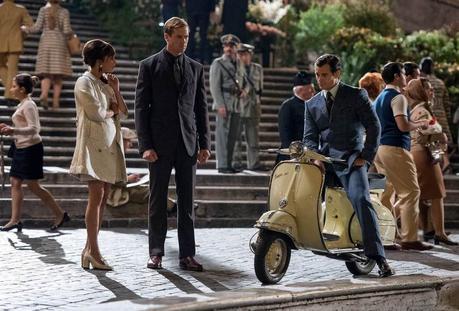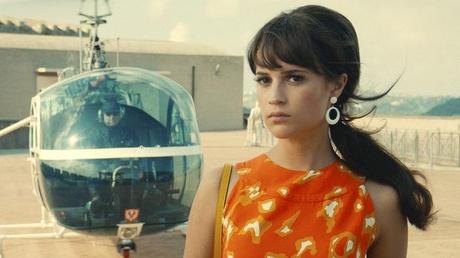On some level, you could sum up director Guy Ritchie’s new Warner Bros. franchise hopeful Man from U.N.C.L.E. as being a spy movie in which beautiful people do awesome things in exotic locations in the early 1960s. On another level, you could perhaps best describe it as being a Guy Ritchie movie. The plot doesn’t revolve around the criminal underworld ala his early work (Lock, Stock and Two Smoking Barrells, Snatch) nor is there a central mystery to be solved as in his two Sherlock Holmes movies with Robert Downey, Jr. However, Ritchie’s signature is all over U.N.C.L.E., from the way it blends action and comedy to its almost overbearing use of music, energetic camera movements and gleeful use of split screen. He even re-uses his Sherlock Holmes trick of presenting us with slightly confusing scenes which only make sense after the fact, i.e., once their role in the latest plot twist is better contextualized. He goes to that well once too often, but the end result is a movie chock full of character and personality in an age in which more and more movies of this scale appear to roll off the assembly line. It is light, breezy summer entertainment in the best way possible.
But where are my manners? I haven’t even offered you the courtesy of a plot description yet. That’s largely because, perhaps to its slight detriment, Man From U.N.C.L.E.’s plot is secondary to world-building and character development.
It’s 1963. An American spy, Napoleon Solo (Henry Cavill), is tasked with getting an East Berlin car mechanic, Gaby (Alicia Vikander), across the wall to help the US government track down her jet scientist father who has been kidnapped by Nazi sympathizers. Along the way, they are delayed by a rather determined Russian, Illya Kuryakin (Armie Hammer) who chases them both in car and on foot, his pursuit having nothing to do with Gaby and everything to do with Solo since he has a price on his head due to his criminal past. Upon successful completion of his mission, Solo reports to his boss (Jared Harris) only to discover that he is now to be teamed up with Kuryakin to travel with Gaby to Italy and stop the no-good Nazis sympathaizers from … I don’t know, blowing something up with a nuclear bomb or maybe simply selling the bomb to the highest bidder.
This is all laid for us in a masterful opening action scene followed by an uneasy meet-and-greet at an outdoor café where Harris acts as Basil Exposition before shuffling off for most of the remainder of the movie. If you don’t pay close enough attention to that scene (consider me guilty) then you’ll never completely understand why exactly Elizabeth Debicki, as the film’s glamorous villain, Victoria Vinciguerra, wants what she wants. The beautiful thing is that it doesn’t really matter because all you really need to know is that there are sexy Nazis who are up to no good, and our sexy spies and their sexy new recruit are going to stop them. Along the way, you will be delighted by the gorgeous scenery of 1960s Italy as well as all the fantastically 60s dresses (and hats and sunglasses) Debicki and Vikander get to wear.
It’s almost delightful how secondary the nuclear bomb is to the plot. Sure, we get that it’s bad, but there’s never really any sense that the world is about to end. There are certainly no toppling skyscrapers or fleeing masses of cannon fodder extras on the ground ala so many modern blockbusters. Instead, the focus is really on building up the characters.

We are told from the get-go, thanks to some well-placed expository flashbacks during the opening chase, that Solo is actually a criminal being forced to work as a spy instead of serving time in prison. We later learn that Kuryakin, while no criminial, is similarly being manipulated by his own government. It’s to Ritchie and his co-screenwriter Lionel Wigram’s credit that Solo and Kuryakin’s partnership and eventually mutual respect for each other never really reaches a point of, “We are not so different, you and I.” This movie is too good for that cliche and in fact one of the standout sequences in the whole movie is a delightfully extended bit in which Solo takes his sweet time contemplating whether or not to let Kuryakin die.
This movie is also too good to simply drop Alicia Vikander’s Gaby into a love triangle with Solo and Kuryakin, which would have been the lazier route to go with it. Instead, she is wisely paired with Kuryakin, her spirited and free personality comically bouncing off of his buttoned-up stiffness. Plot-wise, he poses as her fiancé while Solo poses as an art-dealer who just happens to be in town at the same time, and they plan their next moves from Kuryakin and Gaby’s absolutely gorgeous hotel room. It’s hard to say much more about Gaby without giving too much away, but Variety’s Richard Lawson put it nicely, “Gaby is weirder and cleverer than The Girl often gets to be in pictures like this.” I will add that while I greatly enjoyed her performance I never completely bought Vikander as an East Berlin car mechanic, and I’m not entirely sure what accent she was going for.

Vikander is blowing up right now thanks to Ex Machina and the 6 other films she has on the way in the next year, including the next Bourne movie
That leaves Solo to attempt to seduce Elizabeth Debicki’s Victoria Vinciguerra, who is probably the best Bond girl villain we’ve had in a long, long time despite the fact that this isn’t actually a Bond movie. Decked out from head to toe in glamorous 60s fashion and jewelry, Debicki is stunning and ever-so-slightly severe looking, alluring and imposing at the same time. She steals every scene she is in, and while Vikander’s is the buzzier name Debicki delivers the superior performance.

Elizabeth Debicki has just the right amount of fun with her role in this movie
At one point in its long production history, Man from U.N.C.L.E. was going to star Tom Cruise, which makes sense considering that this is clearly WB’s attempt at getting its own Mission Impossible franchise. Man from U.N.C.L.E. is similarly adapted from an old TV show, and a lot of people who remember the old show, which ran from 1964-1968, seem to have a problem getting into the new movie. However, I’ve never seen the Mission Impossible TV series, and the same goes for Man from U.N.C.L.E. I am not burdened by nostalgia for either franchise. From what I understand, the U.N.C.L.E. movie delivers the “So, how’d they meet?” origin story the TV show never bothered with. It is like a pilot for a new film franchise, and the biggest test is whether or not you walk away from it wanting to see more adventures with these characters. I did.
This is a movie with an overabundance of style, asking very little of the audience before offering a little more than you’d expect. The cast nails the easygoing chemistry, and Ritchie’s directorial showmanship, while a bit overindulgent on a couple of occasions, delivers multiple sequences which are so beautifully staged and memorably edited that they stand out as being pieces of cinema with actual personality. There is a split-screen montage in place of a full-scale action scene near the film’s climax, and while that sounds terrible and lazy it comes off as remarkably fun and endearing, which just about sums up the whole movie. Sadly, the box office returns have not been encouraging so far, but if there is to be no sequel then at least people will probably find this movie on video and cable down the road and wonder, “This is great! Why didn’t I go see this when it was out?” Why indeed.
Special Acknowledgement To:
The soundtrack. Daniel Pemperton’s energetic score along with period specific pop songs, not all of them American either, is the extra ingredient which puts this movie over the top. Here’s a sample:
Second Opinions:
VanityFair | “Maybe this is just glowing praise born out of basement-level low expectations, but I found U.N.C.L.E.’s bouncy vibe to be an utter delight”
io9 | “After watching The Man From U.N.C.L.E., I’m very much hoping there will be a next movie. I want to see these characters pick out more clothes, snipe at each other about new little problems, and have even funnier action sequences. And, I guess, save the world—but that’s not really the substance of this film.”
Trailer

